
The Savvy Campers
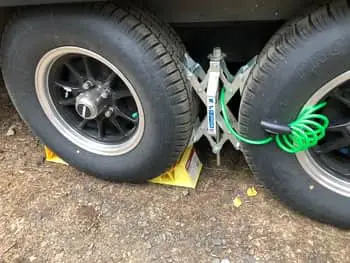

Do You Need to Balance Travel Trailer Tires? Expert Tips and Insights
When planning a trip with your travel trailer, it’s essential to ensure that all components are in good working order, including the tires. Balancing your travel trailer tires is an important aspect of maintaining optimal performance and safety during your travels. This article will discuss the reasons for balancing trailer tires, the potential consequences of neglecting this task, and how to ensure proper balancing.
Travel trailer tires need to be balanced as an unbalanced tire can cause unnecessary vibration, premature wear, and damage to your axle bearings that can lead in failure. An unbalanced tire will cause more heat which can lead to a catastrophic blowout. Most tire dealers have the ability to balance your RV tires.
Balancing travel trailer tires helps to evenly distribute the weight of the trailer, preventing uneven wear, and prolonging tire lifespan. Unbalanced tires can lead to excessive vibration, causing an uncomfortable ride, additional stress on the suspension system, and even accidents. Furthermore, well-balanced tires promote fuel efficiency and a smoother driving experience.
Understanding the importance of balanced tires for your travel trailer is crucial for a safe and enjoyable trip. In the following sections, we will discuss methods for balancing, the signs of unbalanced tires, and when to seek professional assistance. Being proactive in addressing tire balance will contribute to a successful adventure on the road.
You may still be asking yourself if you should balance trailer tires, but let me assure you that you NEED to do this.
Importance of Balancing Travel Trailer Tires
Do you really need to balance your travel trailer tires? The tires on your travel trailer are your lifeline when traveling. The health of your tires is very important, as a blowout could leave you stranded in a remote area.
Tires on vehicles need to be balanced as they are a rotating mass moving at high speeds. A small off balance of weight can change the force that is applied to that one area of the tire causing a tire to vibrate or even bounce at certain speeds. On a travel trailer, this can lead to sway, loss of traction, or the feeling of being uncontrolled.
With a tire bouncing around unbalanced, you may lose traction with the road and cause erratic behavior from your trailer. Also if you lose contact with the road surface, this can enhance sway on your trailer.
Safety and Performance
Properly balancing your travel trailer tires is crucial for ensuring the safety and performance of your RV. Unbalanced tires can cause vibrations, impairing your ability to control the vehicle effectively.
This increases the risk of accidents and can make your journey more challenging. Balanced tires provide better traction on various road conditions and ensure that your wheels are working in unison for a smooth driving experience.
Unbalanced tires can also lead to premature blowouts. Another cause of a blowout can be an unlevel trailer while towing, read about it in our guide here .
Longevity and Fuel Efficiency
Balancing your trailer tires can also contribute to their longevity, as it prevents uneven wear on the tread. When tires are unbalanced, one area of the tire may wear down faster than the rest, leading to a need for earlier replacement. Keeping your tires balanced also improves fuel efficiency, as properly balanced wheels require less energy to rotate.
This means that your travel trailer will consume less fuel, allowing you to save money in the long run.
Comfort and Handling
A smooth ride significantly impacts your comfort when traveling in an RV. When tires are balanced, you will experience fewer vibrations as you drive. This means a more comfortable journey for you and your passengers. Additionally, balanced tires improve handling, making it easier for you to navigate tight turns and maneuver your travel trailer in various situations.
Signs of Unbalanced Tires
Excessive vibrations.
If you experience excessive vibrations while towing your travel trailer, it could be a sign of unbalanced tires. Unbalanced tires can cause noticeable sway and wobble, making it challenging to maintain control of your trailer on the road. Reduced stability can increase the risk of accidents, so it’s vital to address this issue promptly.
Unbalanced tires cause vibration which can rattle rivets, screws, and other items loose on your expensive trailer. Your travel trailer already has enough vibration and earthquake like movement so adding an unbalanced tire can further road damage on the vehicle.
Premature Wear and Tear
Unbalanced tires often lead to uneven wear patterns on your travel trailer tires. This premature wear and tear can result in needing to replace your tires sooner than expected, costing you both time and money. By regularly checking your tires for uneven wear, you can detect unbalanced tires early and take corrective action before the issue escalates.
Damage to Suspension and Components
When your travel trailer tires are unbalanced, it puts additional stress on your trailer’s suspension system and other components. Over time, this extra strain can lead to increased wear and damage to parts such as bearings, axles, and springs.
Keeping your tires properly balanced can help you avoid costly repairs and extend the life of your travel trailer’s components.
Balancing Process and Techniques
Static and dynamic balancing.
To balance your travel trailer tires, you need to understand the differences between static and dynamic balancing. Static balancing ensures the tire remains stationary with no heavy spots when suspended vertically on the axle.
It requires adjusting the tire weight around the center of the bearing to counteract centrifugal force.
Dynamic balancing, on the other hand, involves even distribution of weight around the entire tire circumference. It prevents any side-to-side motion or wobbling while the trailer is in motion, ensuring a smoother ride.
Wheel Weights
Wheel weights are essential tools for achieving proper tire balance. They come in different materials, such as steel, zinc, or lead, and are available in adhesive or clip-on styles. To use wheel weights:
- Identify the heavy spots : Spin the tire and identify the heavy section, which should stop at the bottom.
- Apply the wheel weights : Place the wheel weights opposite the heavy section on the tire’s inner and outer edges, ensuring a uniform distribution of weight.
Professional Tips for Balancing
Here are some professional tips to help you balance your travel trailer tires effectively:
- Check the axle and bearings : Ensure the axle is in good condition and the bearings are properly greased to avoid any balance-related issues.
- Use a tire balancing machine : These machines provide precision and accuracy when measuring tire balance, making it easier to apply the appropriate wheel weights.
- Rotate the tires : Regular tire rotation can help in maintaining even wear, which in turn, keeps balance and handling optimal.
Choosing the Right Trailer Tires
Manufacturer recommendations.
When selecting trailer tires, it’s essential to follow the manufacturer’s recommendations. Trailer tire manufacturers have specific guidelines for size, load capacity, and other properties that ensure the tires support your towing activities. Always check your trailer’s owner’s manual or consult with the manufacturer to confirm the tires meet their standards for safety and performance.
Understanding Tire Ratings and Specifications
In addition to the manufacturer’s recommendations, it’s crucial to understand tire ratings and specifications. These include load capacity, speed rating, and inflation pressure. Load capacity is the maximum weight the tire can support, while speed rating indicates the maximum speed the tire can handle safely. Inflation pressure refers to the appropriate amount of air pressure that should be maintained in the tire for optimal performance.
Consider the following factors when choosing trailer tires:
- Age of the tire : Tires have a lifespan, and it’s generally not recommended to use a tire that’s more than five years old. Look for the “DOT” number on the side of the tire, which provides information on its production date. This will help you avoid purchasing or using aged tires that may not be suitable for safe towing.
- Tire type : Radial or bias-ply tires are commonly used for trailers. Radial tires often provide better heat dissipation and a smoother ride, while bias-ply tires are more durable with stronger sidewalls. Choose the type of tire that meets your specific towing needs and preferences.
- Proper inflation : Maintaining the correct air pressure in your tires is essential to prolong their lifespan and ensure a safe towing experience. Underinflated tires can cause poor handling, reduced fuel efficiency, and increased tire wear. Overinflated tires can cause a harsh ride and uneven tire wear. Always follow the manufacturer’s inflation recommendations.
By following these guidelines and understanding tire ratings and specifications, you can confidently select the right tires for your travel trailer, ensuring safe and enjoyable towing experiences.
Tire Maintenance and Inspection
Regular checks for damage.
Regularly inspect your travel trailer tires for any damages that may have occurred during use. Look for signs of punctures, cracks, or bulges. Excessive heat can cause the rubber to become more susceptible to damage, so pay close attention to your tires after long trips or during hot weather. Examine the tread for uneven wear, which might indicate an issue with your trailer’s alignment.
By promptly addressing these issues, you can prevent a potential tire blowout.
Proper Inflation and Pressure
Maintaining the correct tire pressure is crucial for the lifespan and performance of your travel trailer tires. Over- or under-inflated tires can lead to uneven wear, reduced fuel efficiency, and a greater risk of tire blowout. Check your tire pressure before each trip, using a reliable tire pressure gauge, and adjust the pressure according to the manufacturer’s recommendations. Remember that tire pressure can change due to temperature fluctuations, so make sure to check the pressure when your tires are cool or have not been recently driven.
- Over-inflated tires: May cause a rougher ride, increased wear on the center of the tread, and reduced traction.
- Under-inflated tires: Can lead to increased heat, reduced fuel efficiency, faster tread wear, and a higher risk of blowout.
Monitoring Tire Aging
Even if your tires appear in good condition, it’s essential to monitor their age. Tires degrade naturally over time, and older tires are more prone to blowouts. As a general rule, replace your travel trailer tires every five to seven years, regardless of how they look visually. You can find the tire’s age, indicated by the DOT code on its sidewall. This code reveals the week and year of manufacture, allowing you to determine when it’s time for a replacement. Always check the age of your tires during maintenance and inspections to ensure your travel trailer is safe and roadworthy.
Common Questions
To further assist you, we’ve compiled a list of frequently asked questions and expert answers related to balancing travel trailer tires.
1. How often should I balance my travel trailer tires?
Experts recommend balancing your travel trailer tires every 12,000 to 15,000 miles, or when installing new tires. However, if you experience vibrations or uneven tire wear, it’s essential to get them checked and balanced sooner.
2. Can I balance my travel trailer tires myself?
While it’s possible to balance your tires at home using a portable tire balancer, experts advise seeking professional help for the best results. Tire service centers have specialized equipment and trained technicians who can ensure a precise and accurate balance.
3. Is it necessary to balance all four travel trailer tires at the same time?
Balancing all four tires simultaneously is the best practice. However, if only one tire exhibits signs of uneven wear or vibration issues, you can choose to have it balanced separately. It’s essential to consult with a tire expert to determine the appropriate course of action.
4. What happens if I don’t balance my travel trailer tires?
Neglecting proper tire balancing can result in several issues, such as uneven tire wear, vibrations, poor fuel efficiency, and stress on your vehicle’s suspension components. In the long run, this can lead to costly repairs and decreased tire lifespan.
Remember, whether you are an experienced or first-time travel trailer owner, prioritizing tire balancing is crucial to ensure a safe and comfortable journey.
Travel trailer tires play a crucial role in ensuring a safe and comfortable trip for you and your family. Balancing trailer tires is an essential step in maintaining their longevity and performance . It helps in reducing vibrations, improves fuel efficiency, and ultimately reduces wear and tear on your trailer’s suspension components.
While you might think skipping tire balancing may not cause any significant harm, doing so can jeopardize your safety on the road. Unbalanced tires can lead to accidents due to poor handling, and may also cause uneven and quick wear on your tires.
Regular inspections and routine maintenance are crucial for maintaining your travel trailer tires in optimal condition. By addressing tire issues promptly, you can avoid potential hazards and ensure a smoother, safer journey on your adventures.
Remember that each trailer and tire setup is different; you should always refer to your owner’s manual for specific guidelines on your tire maintenance. When in doubt, don’t hesitate to consult a professional technician to assist you in balancing your trailer tires and addressing any other concerns.
In summary, balancing your travel trailer tires is not a step to be overlooked. By taking the time to ensure your tires are well-balanced, your travels will be safer, more comfortable, and ultimately more enjoyable.
Frequently Asked Questions
Are trailer tires normally balanced.
Yes, trailer tires are generally balanced when you purchase them new. However, over time, the balance can be affected by various factors such as wear and uneven weight distribution. When you notice any symptoms of unbalanced tires or are replacing your tires, it’s a good idea to have them balanced.
Is balancing necessary for single axle trailers?
Balancing is beneficial for single axle trailers , as it can improve the overall performance and increase the lifespan of the tires. Unbalanced single axle trailers can cause uneven tire wear and put additional stress on the trailer’s suspension components.
Should boat trailer tires be balanced?
Yes, boat trailer tires should ideally be balanced. Doing so can help in providing a smoother towing experience and reduces the risk of uneven tire wear, poor handling, and potential damage to the trailer’s components.
How can I tell if my trailer tires are out of balance?
Signs that your trailer tires may be out of balance include uneven tire wear, trailer sway or vibrations at specific speeds, and increased wear on trailer suspension components. If you experience any of these symptoms, consider having your tires inspected and balanced by a professional.
Is tire balancing required for horse trailers?
Balancing tires on a horse trailer is highly recommended. Horse trailers, like any other trailers, can suffer from uneven tire wear and vibrations if the tires are out of balance. Proper tire balancing will ensure a smoother ride, which is ideal for keeping your horses safe and comfortable during transport.
What can happen if I don’t balance my trailer tires?
Not balancing your trailer tires can lead to uneven tire wear, vibrations, poor handling, and increased stress on the trailer’s suspension components. In the long run, unbalanced tires can also decrease the overall lifespan of your tires, resulting in frequent replacements and increased costs.
Do Utility Trailers need to be balanced?
Yes, utility trailers should have their tires balanced for optimal performance. Just like other types of trailers, balancing the tires on a utility trailer can help prevent uneven tire wear, maintain stability, and protect the trailer’s suspension components, ensuring a smooth and safe towing experience.
When tire shopping for your travel trailer, your tire dealer may tell you that trailer tires do not be balanced. This may be true for some lightweight trailers, or utility trailers only used for short amount of times at low speeds, but your travel trailer which runs at high speeds for many miles will be different. Your travel trailer should be keep in the best running shape as possible, which requires its tires to be balanced.
Be the first to be notified about FREE tips, hints, coupon codes, and email-exclusive information. All for FREE!
Related Posts:

Similar Posts
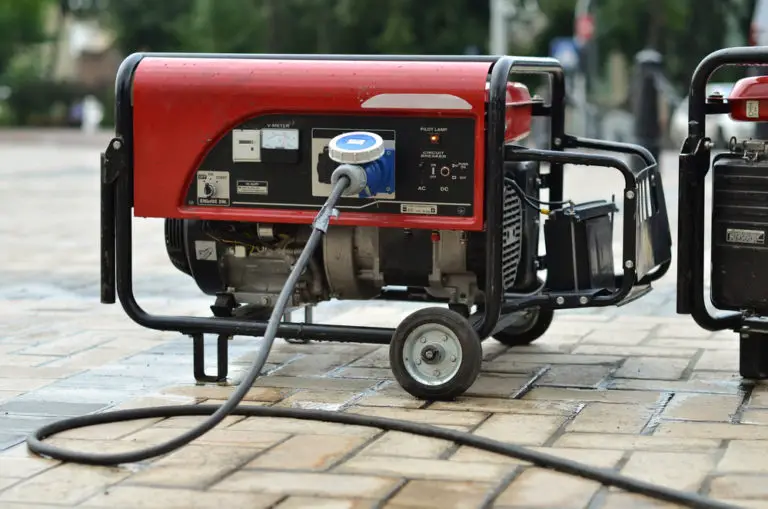
Do Champion Generators Have a Floating Neutral?
The generator industry is one that’s been exploding for the better part of the last several decades. People are more concerned than ever about power outages and having to live life in the dark for any length of time. As a result, many of them are installing either whole-house generators or portable ones, such as…
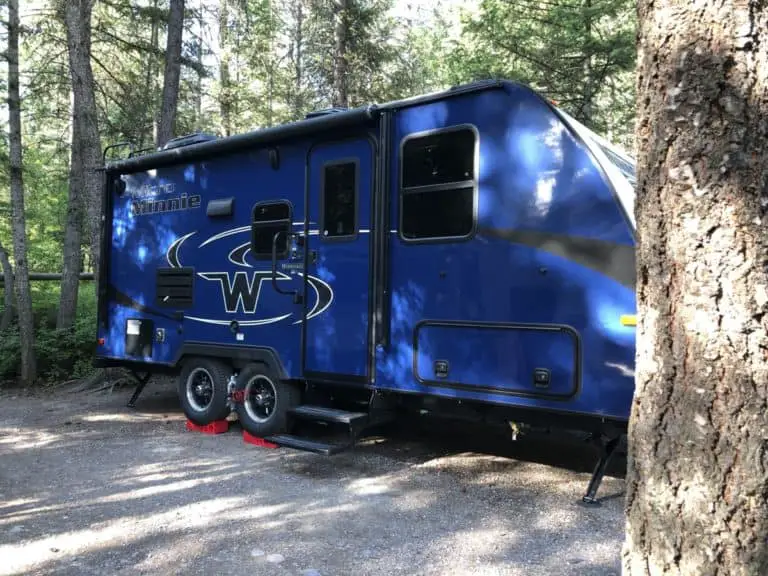
How To Reseal RV Exterior Walls, Windows, and Seams | Plus 4 Tips and Tricks
Whether you’re a new RV owner or have had one for years, resealing your RV’s walls is something that you should be able to do. It’s a necessary part of maintaining a travel trailer, but only a few actually know how. So, how do you reseal your RV exterior walls? To reseal your RV exterior…
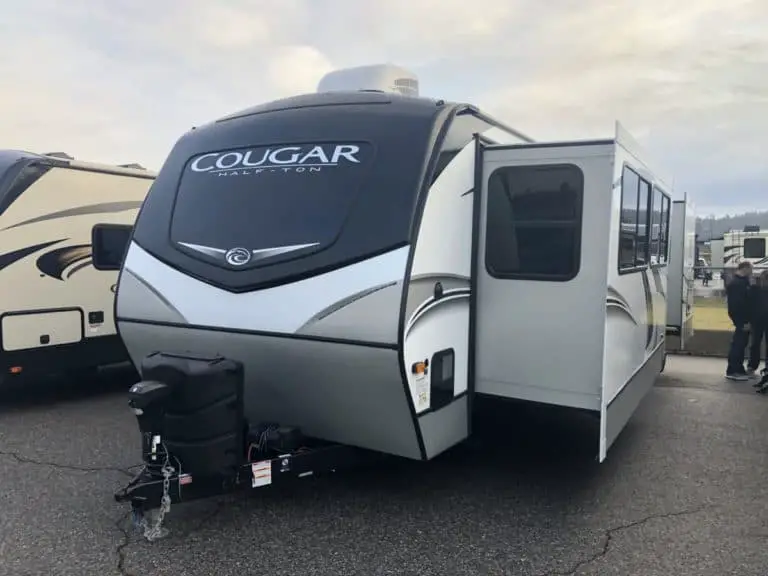
Are Travel Trailer Warranties Transferable?
Owning a travel trailer is a great addition to any family as it can take you on endless adventures that will help you create plenty of memories. No matter what destination you are heading to next, making sure your rig is covered will help you be confident driving down the road without worrying about high…

How to Park a Travel Trailer or RV on a Hill
When traveling or parking your travel trailer for short periods or extended periods of time, you will come across all sorts of terrain. Perhaps your driveway is a steep slope, or storage yard is on a slope, you may wonder if it is safe or if you can park your RV or Travel trailer on…
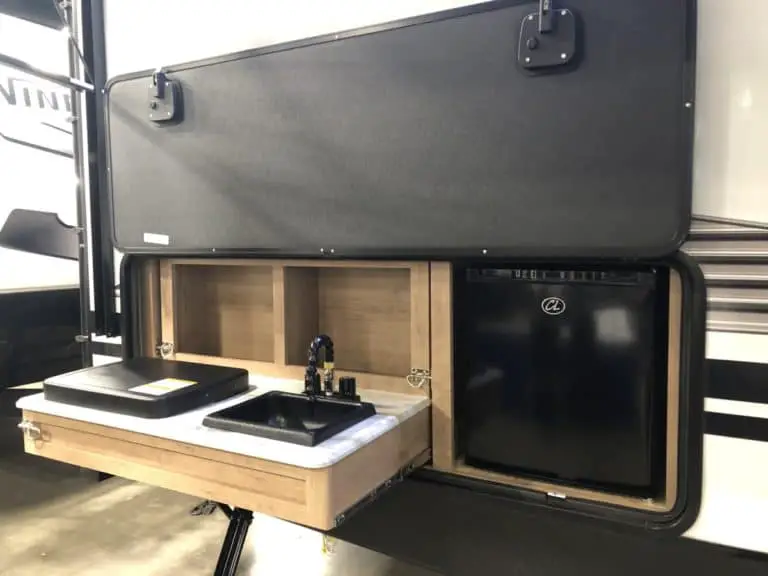
Why Does My RV Water Pump Pulsate When Not in Use and How to Fix It?
When it comes to your RV, there are plenty of inconvenient and annoying things that can happen. From flat tires and power surges to not having proper sway control or weight distribution, RVing is a complicated endeavor. However, one of the more troubling and annoying issues is having a water pump that’s pulsating, even when…
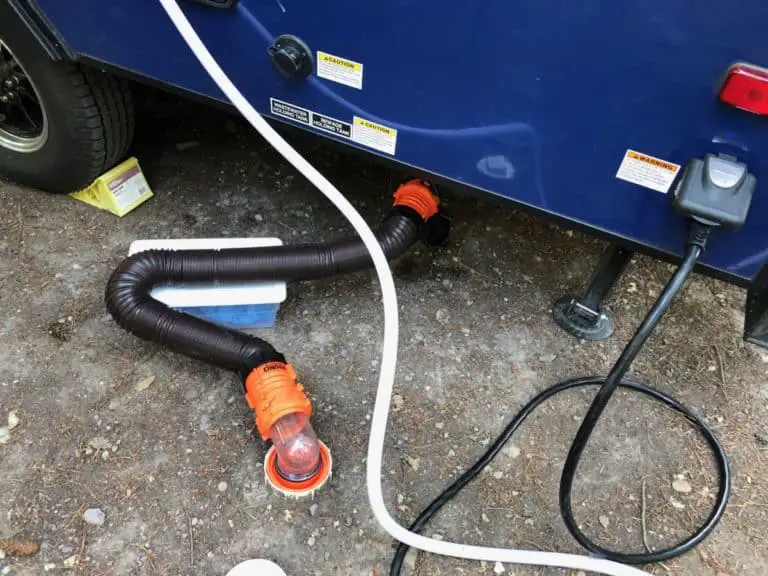
3 Easy Ways to Clean a Black Water Tank
Everything You Need to Know About Your Black Water Tank Travel trailer owners know that this form of camping can bring lots of wonderful experiences and adventures. However, there are parts to owning an RV that can be not so alluring. While it might not be the most glamorous part of owning a trailer, owners…
Join our Newsletter to stay up to date on the latest RV topics and receive our FREE RV Inspection Cheat Sheet Today. Use this tool to inspect new or used campers you are looking at purchasing.
No thanks, I’m not interested!
Do Trailer Tires Need to Be Balanced? Expert Advice Revealed
“Do trailer tires need to be balanced?” is the burning question on the lips of many a trailer enthusiast. As simple as it sounds, the answer can be a game-changer for your travels. Venture into this guide to demystify the balancing act of trailer tires. Learn, adapt, and drive with newfound confidence. Your trailer’s wheels might just thank you for it.
Just like with passenger vehicles, there’s been a long-standing debate on whether trailer tires need to be balanced . As trailers have become more popular for hauling everything from furniture to horses, the question has become even more crucial. With varying views in the market, it’s essential to settle the matter once and for all.
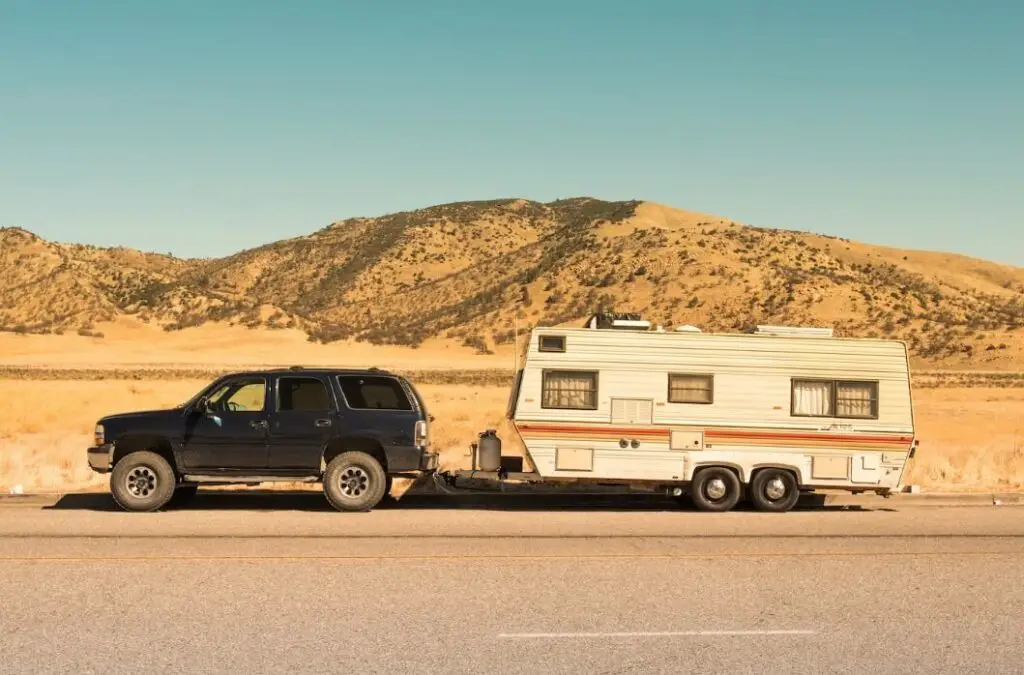
Yes, trailer tires should be balanced. While not every scenario mandates it, balancing these tires can prevent uneven wear, increase their lifespan, and enhance the towing experience. An imbalance can lead to unwanted vibrations and compromise safety. Thus, for optimal performance and safety, experts advise balancing trailer tires.
By diving into the expert perspectives, we hope to provide clarity on this vital topic, ensuring a safer and smoother journey for all your travels.
What is Tire Balancing?
Tire balancing is an essential aspect of vehicle maintenance that plays a pivotal role in ensuring a smooth ride and prolonging the lifespan of your tires. To comprehend its importance, one must first grasp what tire balancing entails and why it’s deemed vital by automotive professionals worldwide.
At its core, tire balancing is the process of ensuring that the weight of the tire is evenly distributed around its axis. This meticulous adjustment ensures that the tire rotates smoothly at high speeds without causing any undue vibrations.
When a tire is imbalanced, certain sections are heavier than others, leading to an uneven distribution of weight. As a result, when the tire rotates, this weight imbalance can cause wobbles or vibrations.
Over time, these vibrations not only result in an uncomfortable ride but can also cause excessive wear and tear on the tire , suspension system, and other critical parts of the vehicle. This uneven wear shortens the tire’s life, leading to more frequent replacements and higher costs in the long run.
Balancing, therefore, not only aims to ensure driver comfort but also plays a crucial role in optimizing tire performance, enhancing safety, and preventing unnecessary expenses.
Why Tire Balancing is Important?
Balancing plays a pivotal role in optimizing the longevity of tires, providing a smoother ride, and preventing premature wear. Properly balanced tires ensure that vehicles operate at their peak efficiency, delivering both safety and comfort for the passengers and the vehicle itself.
Here are five essential reasons that underscore the significance of tire balancing:
- Extended Tire Lifespan: Balanced tires wear out evenly. This even distribution of wear ensures that the tires last longer , saving vehicle owners from frequent tire replacements and additional expenses.
- Improved Fuel Efficiency: Imbalanced tires can lead to increased friction and resistance on the road. Properly balanced tires, on the other hand, maximize fuel efficiency, translating to savings at the pump.
- Enhanced Safety: An imbalanced tire can cause the vehicle to vibrate, potentially leading to a loss of steering precision and control, especially at high speeds. Balancing ensures stable, predictable vehicle handling.
- Reduced Wear on Vehicle Components: Constant vibrations from imbalanced tires put additional stress on the vehicle’s suspension and bearings. Over time, this can lead to premature wear and costly repairs.
- Comfortable Driving Experience: Nobody likes a bumpy ride. Balanced tires minimize vibrations, ensuring a smoother, more comfortable driving experience, especially on long journeys or at high speeds.
Do you know? How to Balance Tires at Home Without Equipment
Differences Between Car Tires and Trailer Tires
Car tires and trailer tires, while both integral to their respective vehicles, serve different functions and, thus, have distinct designs. Their unique roles require different construction methodologies and materials, which can be seen in their performance, wear patterns, and maintenance needs. Recognizing these differences is crucial for optimal tire usage and safety.
Here are some of the most noticeable differences between car tires and trailer tires:
Construction and Purpose
Unlike car tires, which are designed for traction and handling, trailer tires are primarily built to handle loads. This fundamental difference in purpose results in contrasting design philosophies:
- Material and Strength: Trailer tires, often referred to as ST (Special Trailer) tires, are constructed with thicker sidewalls. This robust design helps in bearing heavier loads without bulging, ensuring the tire doesn’t become a weak point when hauling heavy cargo.
- Tread Pattern: While car tires have intricate tread patterns designed for grip, especially during turns or in wet conditions, trailer tires often sport a simpler, straight-line pattern. This design aims to reduce rolling resistance and improve stability under heavy loads.
- Flexibility vs Stability: Car tires need to be flexible to adapt to varying road conditions and to provide a comfortable ride. Trailer tires, on the other hand, prioritize stability over flexibility, ensuring that the trailer remains steady, especially during high-speed travel.
- Heat Dispersion: Considering that trailer tires often bear heavy loads, they’re built to disperse heat more efficiently. Excessive heat can degrade the tire’s integrity, so effective heat management is essential for long-lasting performance.
- Sidewall Design: While car tires might have sidewalls designed for aesthetics or minor performance adjustments, trailer tires possess reinforced sidewalls to counteract the sway or movement that can occur when hauling cargo.
In essence, while car tires focus on delivering a mix of performance, comfort, and safety, trailer tires prioritize stability, load-bearing capacity, and durability, reflecting their core function of hauling loads safely and efficiently.
Wear Patterns
It’s essential to understand that car tires and trailer tires exhibit different wear patterns due to their distinct functions. This distinction arises from the roles they play, their construction, and the stresses they encounter during regular usage.
- Central vs Edge Wear: Car tires, depending on their alignment and inflation, may experience wear on the edges or the center. Misalignment can lead to uneven edge wear, while over-inflation can cause accelerated central wear. Conversely, trailer tires often exhibit central wear primarily due to overloading or over-inflation.
- Flat Spots: Trailers left stationary for prolonged periods, especially when overloaded, may develop flat spots on their tires. In contrast, car tires tend to develop such patterns due to hard braking.
- Scalloping or Cupping: While both types of tires can exhibit scalloping or cupping — a series of dips appearing around the tire’s edge — it’s more prevalent in car tires because of misalignment or worn-out suspension components. Trailer tires might show this pattern due to an imbalance or bearing issues.
- Tread Separation: Because trailer tires bear heavy loads and often remain stationary for extended periods, they are more prone to tread separation. In contrast, car tires, which face regular movement, wear out more uniformly.
Recognizing these wear patterns helps in diagnosing potential issues, ensuring timely maintenance, and optimizing the lifespan of both car and trailer tires.
Must check: 12 Best Boat Trailer Spare Tire Mounts for Safe Towing
Do Trailer Tires Need to Be Balanced?
For years, a key question has lingered in the automotive world: Do trailer tires need balancing? The importance of balancing passenger vehicle tires is well-understood, but there’s a cloud of uncertainty surrounding trailer tires.
Many argue that since trailer tires primarily bear loads, and their primary function isn’t ensuring a smooth drive, the need for balancing isn’t as pronounced. However, others believe that to maximize safety and performance, balancing is crucial.
Yes, trailer tires should be balanced. Proper balancing prevents uneven wear, provides a smoother towing experience, boosts fuel efficiency, and extends the life of the tire. It’s a recommended practice for those aiming for peak performance and safety, even if it’s not always made mandatory.

Given this, while some trailers might come with unbalanced tires straight from the factory, it doesn’t mean balancing should be overlooked. It serves as an essential preventive measure, ensuring the trailer operates efficiently and safely, especially on longer journeys or under heavy loads.
Pros of Balancing Trailer Tires
Those in favor of balancing trailer tires argue that it can lead to a smoother towing experience and longer tire lifespan. It’s not just about immediate benefits but also about long-term savings and efficiency. Let’s dive into some of the main advantages that stem from balancing your trailer tires.
- Enhanced Tire Longevity: Balancing ensures that tires wear evenly. This even wear prevents hotspots and reduces the risk of early tire replacements, thus saving money in the long run.
- Smoother Ride: An unbalanced trailer can lead to vibrations and oscillations. Balancing out the tires helps in minimizing these, ensuring a comfortable journey for both the driver and the cargo.
- Increased Fuel Efficiency: Balanced tires result in a smoother ride, which in turn can enhance the vehicle’s fuel efficiency. This can translate to considerable savings over time.
- Reduced Maintenance Costs: Even wear, and fewer vibrations mean less strain on the trailer’s components. This can cut down on frequent maintenance checks and repairs.
- Improved Safety: Balanced tires offer better road contact, ensuring stable handling, especially when navigating corners or during sudden brakes.
- Optimal Performance: For those seeking the best out of their trailer, balanced tires ensure that the vehicle is operating at its peak, whether it’s carrying light or heavy loads.
Balancing, thus, goes beyond mere comfort. It’s an integral step towards efficient, safe, and economical towing.
Cons and Common Myths About Balancing Trailer Tires
While many experts recommend balancing, there are common myths and misconceptions surrounding the practice of trailer tires. These can lead to confusion, potentially resulting in suboptimal decisions about tire maintenance. Let’s demystify some of the most prevalent misconceptions and also delve into potential downsides associated with tire balancing.
- Added Cost: While balancing does provide numerous benefits, it comes at a price. For those on a tight budget, the additional cost might seem unnecessary, especially if the trailer is used infrequently.
- Time-Consuming: Especially for those with multiple trailers or large fleets, balancing can be time-consuming, taking a chunk out of the workday or delaying trips.
- Balancing is Only for Cars: Some believe that since trailers just carry loads and don’t require smooth rides like cars, they don’t need balanced tires. However, uneven tire wear can affect any vehicle, trailers included.
- All New Tires are Balanced: Some assume new tires are already balanced. In reality, while they might be close, they aren’t necessarily perfect and may still require adjustments.
- Balanced Once, Good Forever: A common misconception is that once tires are balanced, they’re set for life. Tire weight distribution can change with wear, necessitating rebalancing over time.
Understanding the facts and weighing the pros and cons of balancing trailer tires regularly empowers trailer owners to make informed decisions, ensuring they get the most out of their equipment while maintaining safety.
Must see: Why Do People Put Tires on Their Roofs? Discovering the Reasons
Expert Advice and Recommendations on Balancing Trailer Tires
Navigating the landscape of trailer tire maintenance can be tricky, especially when there’s a plethora of information available. Turning to expert advice helps in filtering the noise and understanding what truly matters for the longevity and performance of trailer tires. As one delves deeper, it becomes apparent that context plays a significant role in determining the necessity of balancing.
When Balancing is Critical for Trailer Tires?
While not every scenario requires balancing, certain conditions make it almost imperative for trailer tires. Recognizing these situations can be the difference between a safe journey and potential mishaps:
- New Tire Installation: Whenever you replace old tires with new ones, balancing is crucial. New tires, despite being fresh off the manufacturing line, can have minor weight discrepancies.
- After a Puncture Repair: Once a tire has been repaired, its weight distribution can alter, making rebalancing necessary to restore optimal performance.
- Uneven Wear Indications: If a visual inspection or tire tread depth measurement tool indicates uneven wear, it’s a strong sign that balancing is needed.
- After Long Hauls: Trailers used for long-distance hauling, especially on uneven terrains, may experience changes in tire balance over time.
- Before Critical Trips: If you’re about to embark on a trip that demands optimal trailer performance—be it due to sensitive cargo, challenging routes, or tight schedules—ensuring balanced tires can be vital.
By acknowledging these circumstances and acting proactively, trailer owners can circumvent potential challenges, ensuring their trailers remain in top condition and are ready for the road ahead.
How Often Should Trailer Tires Be Balanced?
Knowing the importance of balancing is just half the story; figuring out the ideal frequency is equally crucial. Trailer tire balancing isn’t a one-size-fits-all solution, as different usage patterns, terrains, and load variations can impact the balancing requirements.
Yes, routine trailer tire balancing is recommended. For most trailer users, experts suggest balancing tires every 10,000 to 12,000 miles or once a year, whichever comes first. However, this can vary based on tire condition and specific usage patterns. Always monitor tires for uneven wear as an indication.
Outside of the routine checks, it’s prudent to balance trailer tires after any tire repairs , after long treks on challenging terrains, or if you notice unusual vibrations while towing. Balancing should also be considered if you change or rotate the tires, ensuring each is optimized for the best possible performance.
DIY vs. Professional Tire Balancing
While many avid DIY enthusiasts may consider balancing their trailer tires at home , there are benefits to seeking professional services. DIY methods, like using beads or fluids, can be effective for some; however, they come with their own set of challenges.
For one, there’s the need for precision – ensuring equal weight distribution isn’t an amateur’s game. Misbalancing can lead to even more severe issues than before.
Professional tire services, on the other hand, utilize specialized equipment that guarantees precise balancing. They also come with the added benefit of an expert’s eye – someone who can spot potential tire issues that might escape the untrained observer.
These professionals can provide guidance on tire health and potential replacements and even offer tips for ensuring optimal longevity.
Lastly, the cost and time invested in procuring DIY tire balancing tools might outweigh the convenience and assurance of getting it done professionally. When it comes to safety and performance, especially on the road, it’s often best to trust the experts.
Key Takeaways: Do Trailer Tires Need Balancing?
The debate over balancing trailer tires can be intricate, but with proper knowledge, making an informed decision becomes clearer. Summarizing our extensive discussion on “ Do you need to balance trailer tires? “, here are the pivotal points to remember:
- Understanding Tire Balancing: At its essence, balancing ensures an even weight distribution around a tire’s axis. It’s a preventative measure against uneven wear and enhances the driving experience.
- Differences in Wear Patterns: Car tires and trailer tires have distinct wear patterns stemming from their unique roles. Recognizing these differences is key to identifying when maintenance is needed.
- The Balancing Debate: While not universally agreed upon, most experts lean towards balancing trailer tires. This ensures a smoother ride, reduces wear, and improves overall tire lifespan.
- Balancing Frequency: Ideally, balance trailer tires every 10,000 to 12,000 miles or annually. However, factors like terrain, tire condition, and usage patterns can necessitate adjustments.
- DIY vs Professional: While DIY methods exist, professional services offer precision and expertise. Specialized equipment and knowledgeable eyes can spot issues, ensuring optimal tire performance and safety.
Navigating the world of trailer tires can be daunting, but equipped with these insights, you’re better poised to make choices that maximize safety and efficiency.
Must check: 13 Best Travel Trailer Tire Pressure Monitoring Systems
FAQs on Do Trailer Tires Need to Be Balanced:
Trailer tire balancing can often raise several questions for owners (such as; do you have to balance trailer tires , do boat trailer tires need to be balanced, signs your trailer tires need to be balanced). To address the most frequent concerns, we’ve compiled answers to some of the common queries below:
Are Trailer Tires Normally Balanced?
Indeed, when you purchase new trailer tires, they typically come balanced. However, as they endure the stresses of the road, it’s natural for imbalances to develop. Factors such as uneven wear, potholes, or even just regular use can affect the tire’s balance. As such, periodic rebalancing becomes essential to maintain optimal performance and safety.
Is Balancing Necessary for Single Axle Trailers?
Single axle trailers might display fewer symptoms of imbalance, like vibrations, but that doesn’t make them immune to the negative effects of imbalance. Balancing is not just about reducing shakes; it’s also about ensuring uniform wear and maximizing tire life. Therefore, even for single-axle trailers, maintaining a balanced tire is a proactive approach to prolong tire longevity and enhance safety.
Should Boat Trailer Tires Be Balanced?
Definitely, boat trailers, by their nature, carry heavy loads. Given the substantial weight of boats and the equipment often stowed on board, it’s crucial to have balanced tires. This ensures not just a smoother ride but also reduces the chances of premature tire wear. Whether cruising to a local lake or on a longer journey to the coast, a balanced boat trailer tire ensures stability, safety, and peace of mind.
How Can I Tell If My Trailer Tires Are Out of Balance?
Detecting an imbalance in trailer tires isn’t always straightforward. However, telltale signs often manifest in uneven wear patterns across the tire’s surface. Additionally, if you notice peculiar vibrations, especially at specific speeds, it might indicate an imbalance. It’s essential to address these symptoms promptly, as ignoring them can lead to accelerated wear and potential safety risks.
Is Tire Balancing Required for Horse Trailers?
Absolutely. Horse trailers carry invaluable and sensitive cargo — the well-being of the animals. Ensuring that the tires are balanced can dramatically improve the ride quality, making journeys more comfortable for the horses. Balanced tires also minimize the potential for sudden tire failures or irregular wear, thereby reducing the risk of on-road incidents and ensuring the animals’ safety.
How Much Does It Cost to Balance Trailer Tires?
Balancing a trailer tire’s cost can vary significantly based on where you are and the chosen service provider. On average, you might expect to pay between $10 to $40 for each tire. It’s advisable to inquire about pricing beforehand and perhaps consider bundling other services, like tire rotation, for a comprehensive maintenance session.
Final Thoughts: Should You Balance Trailer Tires?
The question, “Do trailer tires need to be balanced?” often resonates among vehicle owners. Balancing trailer tires , although sometimes overlooked, is vital for ensuring a smooth journey and enhancing the tire’s lifespan. With trailers playing pivotal roles, from hauling precious cargo to serving recreational purposes, proper tire care is essential.
Yes! Trailer Tires need balancing. Similar to car tires, balancing trailer tires helps evenly distribute their weight, promoting even wear, reducing vibrations, and increasing overall performance. It’s an essential aspect of routine maintenance for a stable and safe ride.
Making a choice to balance trailer tires isn’t just about adhering to best practices; it’s about guaranteeing the safety of every road trip and the longevity of your investment. Knowledge is power. Ensure you’re equipped with the best information to keep your journeys smooth and trouble-free. Safe and balanced travels to all!
You’ll likely appreciate diving into:
- Do Mini Coopers Have Spare Tires? The Surprising Answer!
- How to Remove Paint from Tires: Safe and Effective Techniques
- Why Do My Tires Squeal When I Turn Slowly? An Expert’s Take
- What is a Tire Thumper and Why You Need One?
- Why are F1 Tires Shiny? The Answer Might Surprise You
- Mayflower Tire Changer and Wheel Balancer Combo Review
About Maze Cuban
Hello, I'm Maze Cuban, your go-to expert on winter road safety with snow chains for tires. I share in-depth knowledge about top-notch tire chains, snow tires, and snow socks. I provide detailed guides on tire chain installations and accessories, ensuring your snowy rides are safe and smooth. Journey with me to navigate icy roads with confidence.
Leave a Comment Cancel reply
Save my name, email, and website in this browser for the next time I comment.

OUR MUST-HAVE ITEMS FOR RV'ing
Start your adventure.
We’re reader-supported . When you click on our chosen products, we may receive a commission.
Do Trailer Tires Need to Be Balanced?
Updated on April 16, 2023
Editorial Staff
Reviewed by
Bryan Rainey
Thinking of going tire shopping for your RV? Good for you. While you may be ready to invest in quality trailer tires, one of the biggest concerns on your mind might be whether your RV tires should be balanced.
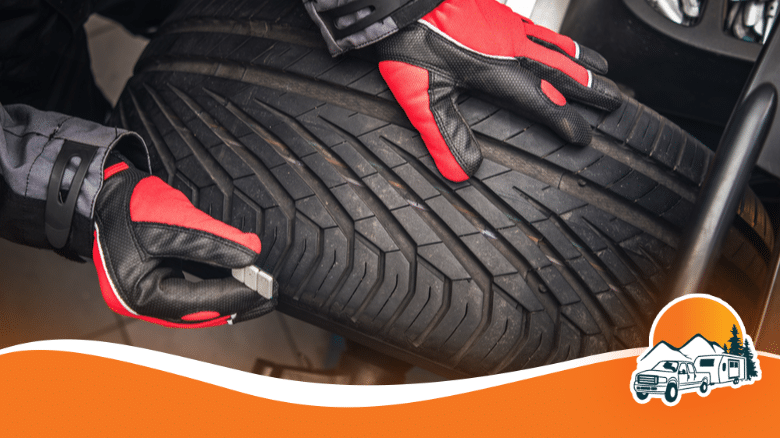
In this article, we will discuss everything you need to know when it comes to balancing your trailer tires.
Yes, trailer tires need to be balanced because it doesn’t only protect the trailer from wear and tear but also ensures its longevity.
Even though the car tires always need to be balanced to ensure the comfort and smoothness of the ride, things are slightly different when it comes to trailers.
You might hear many RV owners or sellers saying that it is not crucial for trailer tires to be balanced. However, when it comes to your trailer, some extra security to ensure its longevity won’t hurt.
Moreover, you’d be surprised to find out that when the trailer tires aren’t balanced, several issues can arise. These issues can potentially compromise the safety of the towing experience of a trailer.
What Happens If a Trailer Tire Isn’t Balanced Correctly?
When the trailer tires aren’t balanced correctly, they may cause several issues. These problems can compromise your trailer’s integrity and cost you in the long run.
Here are a few problems that can arise if your trailer tires aren’t balanced correctly:
Vibration In the Steering Wheel
When the trailer tire wheels are unbalanced, it causes vibration in the steering wheel. This vibration may occur due to damage to the axles of your trailer.
Furthermore, this excessive vibration can cause more extensive damage by loosening the rivets, screws, and other minor yet essential parts of your trailer.
Premature Wear Of Tires
Unbalanced tires in your trailer can cause them to wear and tear prematurely. When the tires are unbalanced, they cause uneven tread on the tire.
This eventually leads to uneven stress distribution on the tires, forcing weaker areas to withstand greater compression.
When less durable areas of the tires withstand chronic stress, they wear out and shorten the life of the tires. Such tires are also at a higher risk of going flat or bursting while you’re traveling. This presents a greater risk of road traffic accidents and potential fatalities.
Damage to Your Axle Bearings
Axle bearings are an important component of a trailer and help maintain wheel alignment and keep it rotating at a normal pace. Unbalanced tires can cause excessive high-speed revolutions of the wheels.
These high-speed revolutions cause an uneven stress distribution on the axle bearings that are helping these wheels rotate. A long-standing pressure on the axle bearings can eventually damage them and affect their function.
Moreover, these high-speed revolutions cause the trailer to hop or move harshly on the road, damaging your vehicle greatly.
Excessive Heating Of Tires
Excessive heating is generally produced due to increased friction between tires and the road. This heating is incredibly damaging to the structural integrity of the tires.
Once the tires’ structural integrity is compromised, the tire’s longevity reduces.
In addition to tire damage, excessive heat production puts pressure on other systems, such as axle bearings. All these problems lead to a reduction in its longevity and a premature breakdown of your trailer.
Damage to Trailer Suspensions
Suspensions are an integral component of your trailer that primarily absorb and decrease the intensity of the shocks from road bumps.
When you drive a trailer with unbalanced tires, the trailer will vibrate excessively. This can damage the trailer suspensions.
These suspensions ensure that your ride is smooth and comfortable. However durable, even these suspensions have a limit for shock absorption, and they can get damaged when unbalanced tires cause your vehicle to vibrate vigorously.
Trailer Tires Would Blowout
As a result of the several effects, such as heating and damage to the axles and suspensions, the trailer tires are likely to get blown out.
The most common cause for tire blowouts is heat production due to underinflation of the tires. But you’ll be surprised to find out that tire blowouts are very common in trailers with unbalanced tires.
This mainly results from imbalanced stress and pressure on the tires, which leads them to expand beyond their limits and eventually get blown out.
Decreased Fuel Efficiency
Unbalanced tires can significantly decrease the fuel efficiency of your trailer. This occurs because the engine undergoes greater stress when you drive with unbalanced tires.
To overcome this stress, the engine has to work harder and requires more fuel to do so. Decreased fuel efficiency means you’ll have to spend a few extra bucks to keep your trailer up and running.
How Do You Know If Your Trailer Tires Aren’t Balanced?
Now that you know the importance of balancing your trailer’s tires, here are a few ways you can help check whether the trailer tires aren’t balanced.
Check For Vibration In the Steering Wheel
The most significant sign of unbalanced trailer tires is unusual steering wheel vibrations. As you drive, you will notice that these vibrations are continuous, and they will tend to get worse as you increase the speed of your vehicle.
Often, the rear tires may be unbalanced. This will extend the vibrations to the car floor and the car seats. This eventually results in a very uncomfortable ride and an overall unsafe towing experience.
Higher Fuel Consumption
Another way to check for an unbalanced tire is to observe the fuel consumption required by your trailer. When a trailer has unbalanced tires, the engine undergoes increased stress.
Your trailer will require more fuel to withstand this stress and work properly. This will affect the overall performance of your trailer’s engine.
3 Ways to Balance Your Trailer Tires
Tire balancing ensures that all your trailer wheels are moving at the same speed. The good news is that you can balance your trailer tires through relatively simple methods.
Mechanical Triangle Spinning
Mechanical triangle spinning is a suitable way to help balance your trailer tires . This method includes attaching the tires to a machine that spins them at very high speeds.
As the tires are spinning, this machine ensures that their spinning rate is the same and they’re rotating simultaneously at an equal pace.
With each rotation, a heavy mass is attached to both tires to observe and then remove any imbalance between them.
Taping Method
In this method, you will start by using a taping tool to determine the imbalance. In the taping method, you should place taping compounds along the tire’s circumference on each side.
If there is a tire imbalance, it would be indicated by a difference in weight on either side. Once the imbalance has been detected, it can be dealt with by adjusting the weights on either side.
Laser Alignment
Laser alignment is a modern technique recently introduced to balance the tires. The tire is spun at very high speeds underneath a laser beam in this method.
This laser beam is able to detect any differences in tire circumference. This process is mainly effective due to centrifugal forces pushing objects away from the midline.
Unbalanced trailer tires can cause a plethora of problems for your trailer. Besides decreasing the longevity of your trailer, they can damage the axles and suspensions and cause premature wear of the trailer tires.
To avoid these problems, you should check if your trailer tires are unbalanced and get them balanced immediately. Keep in mind that if you take good care of your vehicle, it’s gonna take good care of you. Happy traveling!
Popular on Ever RV Right Now!
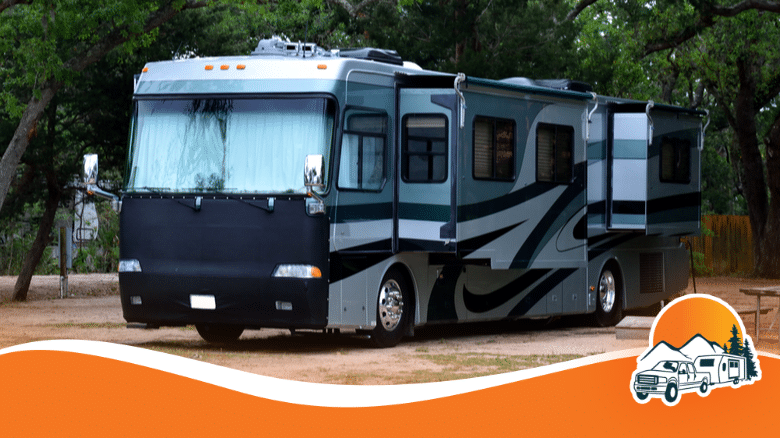
Camping vs Glamping: Everything You Need to Know
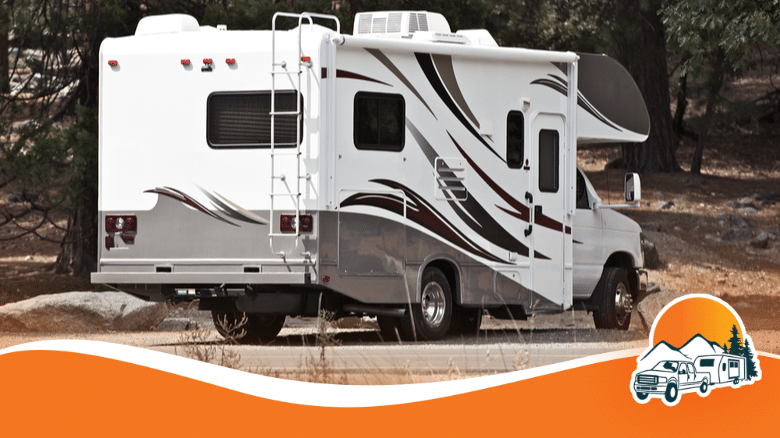
Class C Motorhome Insurance: Comprehensive Coverage Explained

How Do I Keep Mice Out of My Camper?
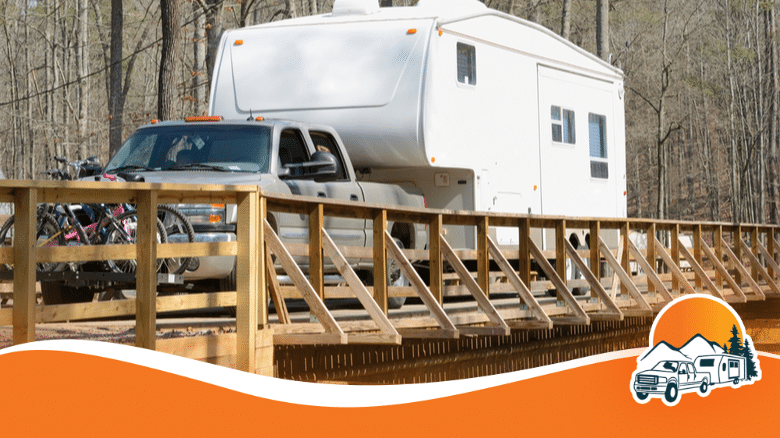
How Tall are 5th Wheel Campers?
Disclosure: Our content is reader-supported . This means if you click on some of our links, then we may earn a commission. See how WPBeginner is funded, why it matters, and how you can support us.
About Editorial Staff
We’re passionate about all things RV and camper, and love sharing tips, “how-to”, and reviewing the latest products to help make your camping experience a success!

The Ultimate
Rv newsletter.
Stay informed about the latest news, tips, and trends in the world of RVing. PLUS receive exclusive offers and discounts on RV-related products and services.
Useful RV Guides
When is it too windy to drive an rv, how to get mail when living in an rv, how much water pressure is perfect for rvs, how to get gasoline smell off your hands and clothes, how to get internet while traveling in an rv, how long can you park at walmart.

10130 Mallard Creek Rd, Suite 300 Charlotte, NC 28262 (704) 741-0509
Helpful Links
- Go To Home Page
- RV Guides and Camping
- RV Rental Guide
- About Ever RV
Support Links
- Terms of Service
- Privacy Policy
- FTC Disclosure
Copyright © 2023 Ever RV, All Rights Reserved. | Sitemap
Ever RV c/o EverRV.com is a participant in the Amazon Services LLC Associates Program, an affiliate advertising program designed to provide a means for us to earn fees by linking to Amazon.com and affiliated sites.
- Skip to primary navigation
- Skip to main content
- Skip to primary sidebar
- Skip to footer

She's Trippy
Female blogger sharing travel and daily life
Should RV Trailer Tires Be Balanced?
07/09/2021 · In: RV's
When you hit the road in your RV, you rack up many miles and hit high speeds. This can cause wear on your RV trailer tires if they aren’t routinely balanced.
You do not have to balance your RV trailer tires. However, balancing your tires can avoid premature tire wear, prevent axel-bearing damage, and prevent unnecessary vibrations.
The question of whether your RV trailer tires should be balanced can be complicated. It is good practice to do so to ensure the life of your investment.
Why Do RV Trailer Tires Need To Be Balanced?
The role of the trailer differs from that of a passenger vehicle, meaning tire balancing is important for different reasons.
Car tires are balanced to help with gripping the road and prevent passengers from feeling the bumps while riding in your vehicle. A driver can notice unbalanced tires in steering as they accelerate their speed, often feeling hop or wobble in their tire.
Trailers are concerned with carrying a cargo load, not a smooth ride for passengers . However, unbalanced tires can still cause wobble and in turn damage to your trailer or the cargo, it carries.
What Does Balancing A Tire Mean?
Your wheel or tire weight may not be perfectly balanced during the manufacturing process. This requires the need to balance your wheels and tires.
You complete this balancing act via a machine that spins the tire and measures its centrifugal force. Weight is then added to the opposite side, compensating for any unbalanced rubber from your tire. Once the weight tests good, the process is completed.
What Damage Does An Unbalanced Tire Cause An RV?
If one trailer tire is unbalanced, it could cause unbalanced weight in your trailer that is applied to one tire causing it to vibrate or even bounce. For an RV, this could mean sway and loss of traction.
Unbalanced RV trailer tires can cause heat leading to:
- Premature tire wear
- Tread separation (which at highway speed can have serious consequences)
- Loss of traction, causing erratic trailer behavior
Unbalanced tires can also cause vibration, leading to:
- Rattling rivets, screws, and other items
- Lose of loose items causing extra expense
- Axle bearing failure
- Suspension component damage
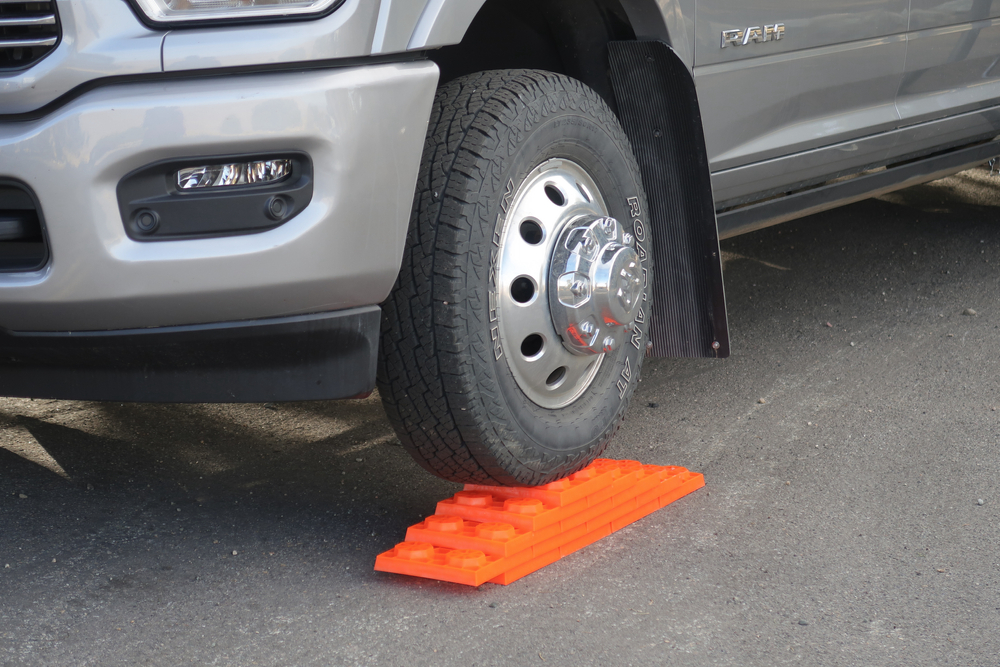
Shake and vibration caused by unbalanced tires can also damage cargo being transmitted. Prolonged vibration can lead to shaking and breaking of items being hauled.
How Do You Identify Your Trailer Tires?
Trailer tires are categorized by either Special Tire (ST) or Light Truck (LT).
A typical tire name would be, for example, ST 205/75 D14.
The 205 is the width of the tire while 75 represents the tire’s height being 75 percent of its width. The D (sometimes will be an R), signifies a bias-ply tire. The 14 that follows the D or R is the diameter in inches.
Importance Of Load Range On A Trailer Tire
The load range tells you the load capacity of your tires. It is rated with a single letter, such as A, D, etc.
Load range varies between sizes of the tire. The best practice would be to select tires with a load capacity that matches the load capacity of the tires that came with your trailer.
It is important to keep in mind that other trailer components also have a weight capacity, not just your tires. That means increasing your tire capacity may not change the load capacity of your trailer.
Where Can You Balance Your Trailer Tires?
This can often be a controversial topic. Some believe that most dealerships or tire stores can balance RV trailer tires.
Some trailer wheels have unique designs. Those unique designs could require you to go to a shop that uses an adapter and can balance wheels based on lug holes.
It is important to note that when you pay a dealer to install new tires that you often pay for both a mount and balance.
Calling your trusted RV dealership or the place you purchased your trailer would be a good first step in finding where you can balance your trailer tires.
How Long Do Trailer Tires Last?
You want to replace trailer tires every three to six years. It can depend on the tire.
If you don’t use your trailer often, tires can soak up harmful UV rays, have dry rot, or gain flat spots.
Even if they are in regular use and look ok from the outside, it is good practice to replace trailer tires. Recommendations are between 5 to 6 years old at most or if you’ve run them for roughly 10,000-12,000 miles.
Bad Ride? It May Not Be Your Tires
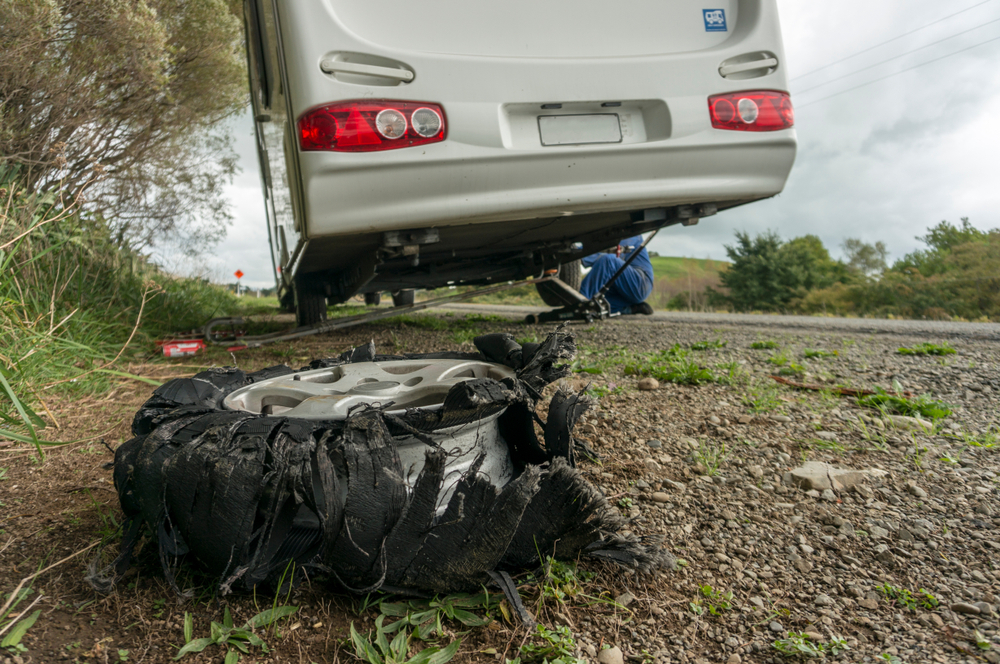
If you have balanced your trailer tires and still see tread damage or have blowouts, it could be several other factors.
These include:
- Underinflated tire causing excessive heat
- Tire overload
- Exceeding the speed rating
- Bent spindles
If you still have problems, your tires could also be out of round. This is when your tire becomes oval-shaped. It can be corrected by rotating the tire 180 degrees on the wheel.
Balancing your RV travel trailer tires is not necessary, but it is good practice. An unbalanced travel trailer tire can cause catastrophic damage to your road journey, leaving you stranded on the side of the road or in a remote area.
you’ll also love

Stay in the Loop!
Join the E-News and get a FREE Travel Planner Drop Your Email Address Below and hit Subscribe *

Can You Charge An RV Refrigerator?
- Shop the Boutique
- Shipping and Delivery
- Privacy Policy
- Refunds and Returns Policy
Stay in the Loop
Copyright © 2024 · Theme by 17th Avenue
Find the best travel related apparel and accessories at She's Trippy!! Dismiss

- You are here:
- Home »
- Blog »
- » Do Trailer Tires Need To Be Balanced? (Helpful Guide)
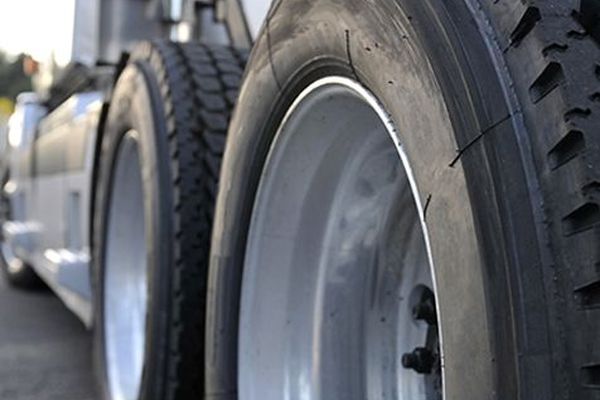
Do Trailer Tires Need To Be Balanced? (Helpful Guide)
- December 27, 2022 /
- By James V.
If it wobbles. That seems to be the rule of thumb when it comes to any tire. If it wobbles, then you should balance it, including trailer tires. Not everyone will agree on this as they will say trailer tires do not need balancing. It is your call whether you do it or not.
Yes, trailer tires should be balanced. Those tires will affect your handling as well as your mpg efficiency. You should have them balanced for safer towing and to get more miles per gallon on every tank full of fuel. The only reason they shouldn’t be balanced is if they do not move very often.
To learn more about this topic, just continue to read our article. It has the information you need to know about before you put those new tires on your trailer. It is possible that your old trailer tires will wear out before you see any ill effects from unbalanced tires.
Do Trailer Tires Need To Be Balanced?
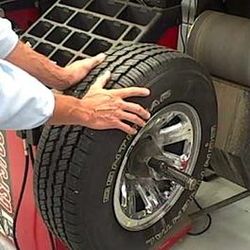
There may be many tire dealers who will say no to this question. They feel that balancing trailer tires is a waste of time and money. However, if they practice the idea that ‘the customer is always right’ and the customer is paying for the balancing, then they should balance them for you.
In some owners’ minds, you do not need to balance your trailer tires, if it is not going to be on the road very often. They feel that the tires will rot away first before you see any negative effects from unbalanced tires.
If that is your situation, then you might want to save some money and not balance them. But if you take your trailer out on the road quite often, then it is better to balance them than not.
You have enough problems with sway and other towing issues and you do not need to add unbalanced tires to that long list of issues you have to deal with. Then the type of trailer you own will dictate if you need to balance your tires or not.
A utility trailer that is used for minor hauling of trash or landscaping materials, etc., should not need its tires balanced. You may not drive fast enough to worry about it.
Finally, this may be a moot point as it has been reported that newer trailers do come with pre-balanced tires.
Do Single-Axle Trailer Tires Need To Be Balanced?
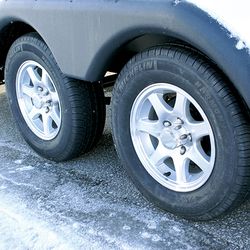
Yes and no. One expert pointed out that if you are using galvanized wheels on your trailer, then the zinc coating is the problem. The zinc coating does not distribute evenly and puts more weight on one part of the wheel than on another.
This situation requires that your trailer have balanced tires or wheels for it to work right. Sometimes, trailer tires and wheel makers line up the light spot on the tire with the heavy spot on the wheel.
This balances your tires to some degree but it may not be perfect or done all the time. The problem is, that many tire centers are not set up to balance trailer tires. That is why they say you do not need it done.
Trailer tires are usually lug-centric while regular tires are hub centric. This difference makes it very hard for some tire centers to balance trailer tires. If they are willing to do it, expect to pay for that additional work to get the equipment ready.
Do Boat Trailer Tires Need To Be Balanced?
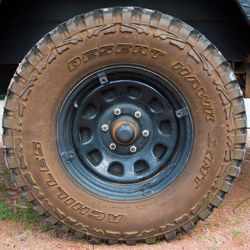
You may get differing opinions on this as well. The main reason why you would balance your boat trailer tires is to keep the ride smooth and to protect your tire from uneven wear.
When they get the latter, they can wear out faster and you will be buying new tires sooner than you want to. There will be people who say differently. Their reasoning is that the weight of the boat keeps the trailer level and there is no need to add more weight to the tires.
If you do see your boat trailer tires wearing unevenly, then check your tire pressure. If they are not the same, then you will get extra wear and tear on the rubber.
Make sure to not under-inflate those tires either. Nor should you over-inflate them. Stick to the psi rating on the side of the tire to make sure they last longer and provide you with a trouble-free ride.
Why Are Trailer Tires Not Balanced?
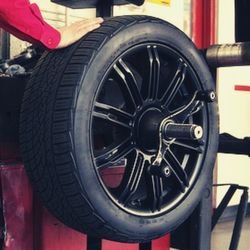
The most common reason is that most tire centers think you do not need to balance them. These tires are just hauling weight and have no steering or other duties so there is less of a need to make sure they are balanced.
However, you should ignore that advice and balance your trailer tires. The reasons you should do so are that unbalanced tires can cause unnecessary vibration, premature wear, and damage to your axle bearings, as well as create too much heat that will cause the tire to blow.
But if you do not tow your trailer that often, it is up to you to balance them or not. Most people do not do this as their trailers sit for a long period of time and are only on the road sparingly.
You will find proponents of both sides of this debate no matter who you talk to. Crawl under your new trailer to see if they have been balanced by the manufacturer.
Some Final Words
Balancing your trailer tires seems to be a good idea. It helps you have a safer journey, and protects against vibration and other possible issues, and towing should be a lot easier if you do it.
But as we said, it is not mandatory for you to do this. If you do not have the budget for balancing your tires or do not want to spend the money, then you can opt out of this option.
We just recommend you do it to be safer.
Related Posts
How Long Do 22.5 Tires Last? (Truck Tire Life Expectancy)
Are Freedom Hauler Tires Any Good? (Trailer Tires Reviews)
Best Tires For E450 Motorhome (Tire Size and Pressure)
Leave a Comment:

- Call (888) 619-5622

- Sign Up/Sign in
- --> --> --> Gift Certificates --> --> --> --> Recently Viewed --> --> -->